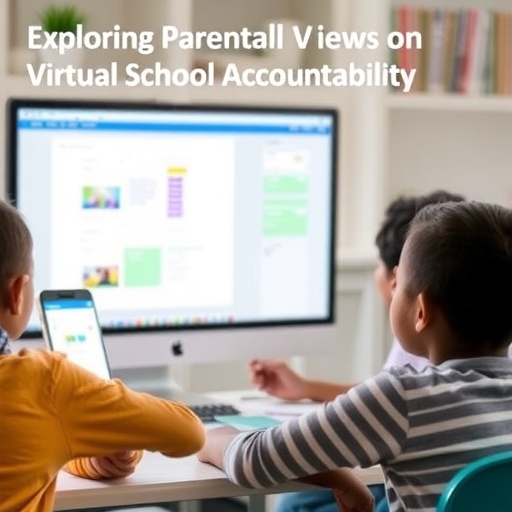In the realm of education, accountability has long been a topic of heated debate, especially among the parents of students enrolled in virtual schools. A recent study conducted by Kingsbury, Marshall, and Maranto dives deep into the perceptions of these parents concerning public school accountability. Their findings, published in Discov Educ, provide an intricate look at how virtual schooling phenomena shape parents’ views and expectations regarding educational standards and transparency.
As the landscape of education continues to evolve, especially with the rapid advancement of technology, virtual schools have emerged as viable alternatives to traditional educational institutions. Yet, this shift has brought forth a myriad of challenges, particularly in the context of accountability. Parents of students in virtual schools often find themselves navigating uncharted waters, trying to comprehend the metrics by which these institutions are judged. This research explores this exact quandary and sheds light on the evolving expectations of parents in an increasingly digital educational environment.
The study reveals a complex web of perspectives held by parents regarding the accountability measures in place for virtual education. While many parents appreciate the flexibility offered by online schooling, they simultaneously express concern that this flexibility might come at the expense of rigorous educational standards. This interplay between freedom and accountability raises pivotal questions about the reliability of virtual education systems. Are these systems capable of providing the level of education they promise while being held to the same standards as their traditional counterparts?
Of particular interest in the study is the recognition that parents vary widely in their understanding of accountability frameworks. Some parents expressed a strong belief that accountability should be defined and implemented with clear metrics, akin to what is observed in conventional schools, whereas others favored a more flexible interpretation that considers the unique attributes of virtual learning environments. This divergence illustrates the need for schools and policymakers to engage with parents more effectively and articulate clearer, more accessible accountability standards that resonate with diverse parent populations.
Importantly, the study indicates a growing trend of parents demanding transparency from virtual schools. A pervasive belief among surveyed participants is that, in order to have confidence in a school’s ability to deliver quality education, there must be concrete proof of accountability measures. This could manifest in the form of regular progress reports, standardized testing results, and comprehensive evaluations of educators and curricula. As technology continues to facilitate unprecedented access to information, parents increasingly expect real-time data regarding their children’s educational performance and school effectiveness.
While many parents are vocal about their desire for more accountability, some are simultaneously wary of the stringent measures often associated with traditional education systems. This paradox highlights the necessity for virtual schools to develop accountability models that are both transparent and tailored to the unique challenges posed by online education. Indeed, there is an urgent need for a framework that maintains high educational standards without stifling the innovative approaches that make virtual learning appealing.
The emotional responses from parents regarding accountability are as significant as their intellectual stances. The study illustrates that feelings of trust—or the lack thereof—are central to parental perceptions of education quality. These emotional dynamics can heavily influence decisions about where to enroll children. Parents who feel that they have no real voice in accountability processes may become disillusioned and opt to withdraw their children from virtual schools. Hence, building trust through open communication and active engagement may serve as a cornerstone for improved accountability perceptions.
Kingsbury, Marshall, and Maranto’s research also explored comparative perspectives of parents who have experience with both traditional and virtual education systems. Interestingly, these parents often expressed a nuanced understanding of the strengths and weaknesses of each form of schooling. Their reflections provided insights that may help inform future educational innovations and policies that aim to bridge the gap between traditional measures of accountability and the evolving landscape of virtual learning.
Engaging with this research is vital as policymakers and educators seek to develop accountability strategies that not only satisfy regulatory demands but also resonate with the lived experiences of families engaged in virtual schooling. For these strategies to be effective, they must prioritize meaningful parent involvement and acknowledge the multifaceted nature of educational accountability.
As the digital divide continues to present challenges, especially in terms of access and equity, the findings of this study underscore the importance of addressing systemic issues within virtual school accountability frameworks. Parents from various backgrounds may experience unique challenges navigating these systems, and their feedback is crucial to ensuring that accountability standards are equitable and reflective of diverse community contexts.
Moreover, as the future of education rests upon the integration of technology, parents’ perceptions of accountability in virtual settings may influence wider conversations about educational reform. This research signals a potential shift in how educational institutions conceptualize accountability—moving from rigid assessments towards more dynamic, inclusive measures that reflect the needs and perceptions of families.
In closing, the study by Kingsbury, Marshall, and Maranto serves as a potent reminder of the critical role parents play in shaping educational accountability. Their insights reveal not only the challenges but also the opportunities that lie ahead in the realm of virtual schooling. As education becomes increasingly digitized, the collaboration between stakeholders—parents, educators, and policymakers—will be essential in forging a path toward a future where accountability in education is transparent, meaningful, and inclusive for all.
Subject of Research: Virtual school parent perceptions of public school accountability.
Article Title: Virtual school parent perceptions of public school accountability.
Article References:
Kingsbury, I., Marshall, D.T. & Maranto, R. Virtual school parent perceptions of public school accountability.
Discov Educ 4, 296 (2025). https://doi.org/10.1007/s44217-025-00667-4
Image Credits: AI Generated
DOI: 10.1007/s44217-025-00667-4
Keywords: virtual schools, public school accountability, parent perceptions, educational standards, transparency.




